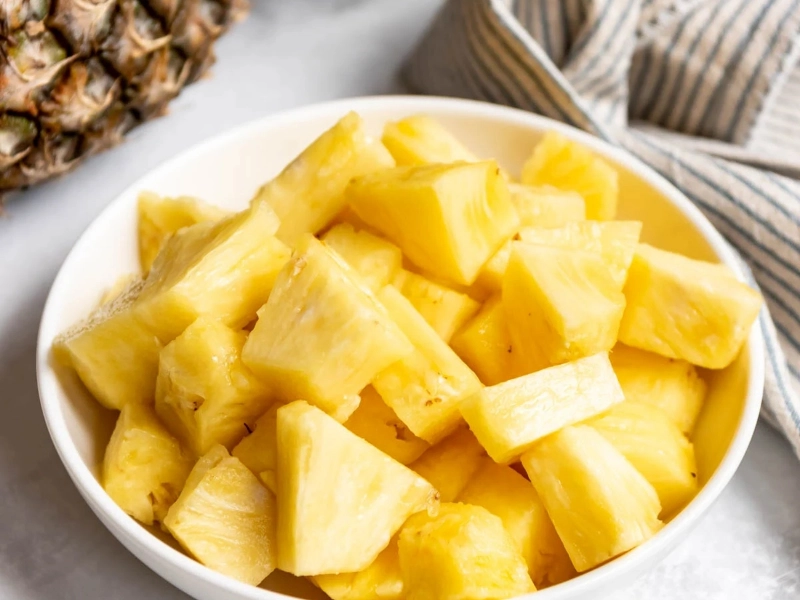An potent antioxidant found in pineapples reduces inflammation and boosts immunological health. Moreover, bromelain, which thins mucus and treats respiratory disorders including sinus congestion, is present in it. In rats given high cholesterol diets, pineapple vinegar has been demonstrated to reverse hepatotoxicity and vascular dysfunction. Additionally, it enhanced hepatocyte shape and decreased hepatic levels of triglycerides and cholesterol.

 The most economically important member of the Bromeliaceae family is the tropical herbaceous monocotyledonous plant known as the pineapple (Ananas comosus). Christopher Columbus brought it to Europe for the first time in 1502, on his second visit to the Caribbean island of Saint Helena.
A healthy immune system, digestive systems, and bones can all be supported by the vitamins and nutrients included in pineapples. Additionally, they contain the chemical bromelain, which has anti-inflammatory and pro-protein digestion properties.
In one study, over the course of nine weeks, participants who consumed a lot of pineapple observed improvements in their haemoglobin levels. It's possible that vitamin C enhances the body's ability to absorb iron.
Pineapple can be eaten raw, grilled, or blended into salads and smoothies. It's crucial to remember that pineapple may conflict with blood thinners, so if you use blood thinners, speak with your doctor before consuming pineapple. If you are allergic to pineapple or suffer from acid reflux, it is also advisable to stay away from raw pineapple.
The most economically important member of the Bromeliaceae family is the tropical herbaceous monocotyledonous plant known as the pineapple (Ananas comosus). Christopher Columbus brought it to Europe for the first time in 1502, on his second visit to the Caribbean island of Saint Helena.
A healthy immune system, digestive systems, and bones can all be supported by the vitamins and nutrients included in pineapples. Additionally, they contain the chemical bromelain, which has anti-inflammatory and pro-protein digestion properties.
In one study, over the course of nine weeks, participants who consumed a lot of pineapple observed improvements in their haemoglobin levels. It's possible that vitamin C enhances the body's ability to absorb iron.
Pineapple can be eaten raw, grilled, or blended into salads and smoothies. It's crucial to remember that pineapple may conflict with blood thinners, so if you use blood thinners, speak with your doctor before consuming pineapple. If you are allergic to pineapple or suffer from acid reflux, it is also advisable to stay away from raw pineapple.
 Antioxidants and bromelain, two naturally occurring substances found in pineapples, may benefit liver health. They may aid in cellular detoxification and the reduction of inflammation. Manganese is another important mineral that can be found in the fruit. a vitamin that helps enzymes involved in the synthesis of bones and the metabolism of cholesterol work together as cofactors. Low intakes of this mineral may raise the risk of diabetes and other chronic illnesses, according to studies.
Manganese is abundant in pineapples; a medium-sized pineapple supplies around 10% of the Recommended Daily Allowance (RDA) for this mineral. For people in good health, this quantity is regarded as sufficient.
According to a clinical investigation, women with higher blood manganese levels had fewer PMS symptoms than those with lower manganese levels. Reduced risks of osteoporosis, diabetes, and heart disease have been associated with high levels of the metabolite manganese dioxide. Additionally, it has been proposed that it might shield the blood against atherosclerosis and other cardiovascular diseases by preventing the oxidation of low-density lipoprotein (LDL) cholesterol.
Antioxidants and bromelain, two naturally occurring substances found in pineapples, may benefit liver health. They may aid in cellular detoxification and the reduction of inflammation. Manganese is another important mineral that can be found in the fruit. a vitamin that helps enzymes involved in the synthesis of bones and the metabolism of cholesterol work together as cofactors. Low intakes of this mineral may raise the risk of diabetes and other chronic illnesses, according to studies.
Manganese is abundant in pineapples; a medium-sized pineapple supplies around 10% of the Recommended Daily Allowance (RDA) for this mineral. For people in good health, this quantity is regarded as sufficient.
According to a clinical investigation, women with higher blood manganese levels had fewer PMS symptoms than those with lower manganese levels. Reduced risks of osteoporosis, diabetes, and heart disease have been associated with high levels of the metabolite manganese dioxide. Additionally, it has been proposed that it might shield the blood against atherosclerosis and other cardiovascular diseases by preventing the oxidation of low-density lipoprotein (LDL) cholesterol.
 The pineapple, or Ananas comosus, is a tropical fruit that is farmed for its juice and fruits, both fresh and tinned. It is a significant commercial crop and the fourth most farmed tropical fruit. Moreover, it is the primary source of bromelain.
It has high levels of dietary fibre, manganese, and vitamin C. Vitamin C is necessary for healthy immunological function, iron absorption, and growth, and manganese provides antioxidant qualities to keep body cells from oxidising.
Research suggests that eating a high-fibre diet is linked to a lower risk of developing chronic illnesses, including type 2 diabetes and cardiovascular disease. In one study, obese individuals who consumed more soluble fibre from pineapple showed better liver health markers than those who consumed less.
Children who consumed moderate amounts of pineapple (2 cups or 140 g) or high amounts (4 cups or 280 g) experienced a significant reduction in viral and bacterial infections compared to those who did not eat pineapple, according to a 9-day study. This was ascribed by researchers to pineapple's anti-inflammatory bromelain.
The pineapple, or Ananas comosus, is a tropical fruit that is farmed for its juice and fruits, both fresh and tinned. It is a significant commercial crop and the fourth most farmed tropical fruit. Moreover, it is the primary source of bromelain.
It has high levels of dietary fibre, manganese, and vitamin C. Vitamin C is necessary for healthy immunological function, iron absorption, and growth, and manganese provides antioxidant qualities to keep body cells from oxidising.
Research suggests that eating a high-fibre diet is linked to a lower risk of developing chronic illnesses, including type 2 diabetes and cardiovascular disease. In one study, obese individuals who consumed more soluble fibre from pineapple showed better liver health markers than those who consumed less.
Children who consumed moderate amounts of pineapple (2 cups or 140 g) or high amounts (4 cups or 280 g) experienced a significant reduction in viral and bacterial infections compared to those who did not eat pineapple, according to a 9-day study. This was ascribed by researchers to pineapple's anti-inflammatory bromelain.